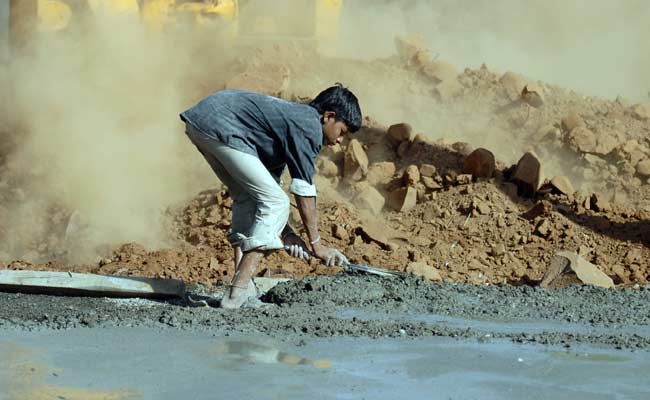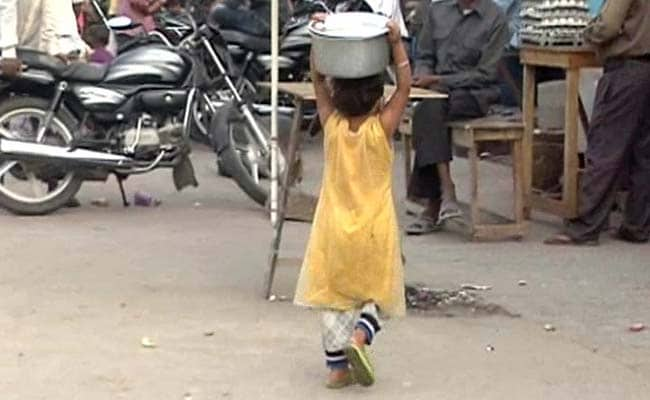The Child Labour (Prevention) Bill was cleared by the Lok Sabha with all its controversial provisions.
- Thorny issues include cutting number of hazardous professions - 83 to 3
- Professions where children work 15 hours a day not considered dangerous
- Labour in traditional skills have been allowed after school hours
Did our AI summary help?
Let us know.
New Delhi:
After almost six hours and many a robust voice of Opposition, the Child Labour (Prevention) Bill 2016 cleared the Lok Sabha with all its controversial provisions.
These included the slashing of the number of hazardous professions from 83 to 3. Sweatshops where young children work an average of 15 hour days -- zari making, bangle making, tanneries or bidi making -- are no longer considered dangerous.
In addition, activists said a provision that allows children under 14 to work in family enterprises after school leaves room for exploitation. The loophole, critics say, is the loose definition of the term "family".
The current law prohibits children under 14 from working only in hazardous jobs, although even this is not properly implemented, say activists.
 A chunk of India's children have to earn their bread.
A chunk of India's children have to earn their bread.
"Research after research has shown that the trafficking of children is mostly done by those who claim to be uncles of the child. Now what are you going to do to prove they aren't? A DNA test?" said Congress leader Ranjeet Ranjan.
Criticising the government's decision to allow some forms of labour after school hours or during vacations, lawmaker from Biju Janata Dal, Kalikesh Singh Deo, said, "A cobbler's son will become a cobbler and nothing else. Is this what you want to bring as a bill? Is this what democracy is all about?"
The government has defended the decision saying some children needed to learn traditional skills and those families needed a helping hand.
"Artists learn art in their childhood," said Union Labour Minister Bandaru Dattatreya in his reply to the House. "We have not allowed children under 14 to work, except after school and in family enterprises. There is no employee-employer relationship in a family," he said.

Speaking on the larger issues this raises, DMK lawmaker Kanimozhi said when a similar attempt was made in Tamil Nadu by her father M Karunanidhi, there was so much opposition, that he had to quit. "It's really unfortunate that democracy works on numbers," she told NDTV.
Her view was supported by Nobel laureate Kailash Satyarthi who tweeted his disappointment after the bill was passed.
"This is a lost opportunity. We will be failing generations and generations of our children," he told NDTV. "The bill is self-defeating. The assurances I was given by the government on the issues raised have not been considered."
India has one of the highest rates of working children in the world. But many within and outside Parliament feel the amendments may reverse the gains of the last three decades.
"Do we really want to 'Make in India' on the backs of these children?" asked Enakshi Ganguly from HAQ Centre For Child Rights.
These included the slashing of the number of hazardous professions from 83 to 3. Sweatshops where young children work an average of 15 hour days -- zari making, bangle making, tanneries or bidi making -- are no longer considered dangerous.
In addition, activists said a provision that allows children under 14 to work in family enterprises after school leaves room for exploitation. The loophole, critics say, is the loose definition of the term "family".
The current law prohibits children under 14 from working only in hazardous jobs, although even this is not properly implemented, say activists.

"Research after research has shown that the trafficking of children is mostly done by those who claim to be uncles of the child. Now what are you going to do to prove they aren't? A DNA test?" said Congress leader Ranjeet Ranjan.
Criticising the government's decision to allow some forms of labour after school hours or during vacations, lawmaker from Biju Janata Dal, Kalikesh Singh Deo, said, "A cobbler's son will become a cobbler and nothing else. Is this what you want to bring as a bill? Is this what democracy is all about?"
The government has defended the decision saying some children needed to learn traditional skills and those families needed a helping hand.
"Artists learn art in their childhood," said Union Labour Minister Bandaru Dattatreya in his reply to the House. "We have not allowed children under 14 to work, except after school and in family enterprises. There is no employee-employer relationship in a family," he said.

Speaking on the larger issues this raises, DMK lawmaker Kanimozhi said when a similar attempt was made in Tamil Nadu by her father M Karunanidhi, there was so much opposition, that he had to quit. "It's really unfortunate that democracy works on numbers," she told NDTV.
Her view was supported by Nobel laureate Kailash Satyarthi who tweeted his disappointment after the bill was passed.
#ChildLabour (Prohibition and Regulation) Amendment Bill 2016 is a missed opportunity to protect our children and generations to come.
- Kailash Satyarthi (@k_satyarthi) July 26, 2016
"This is a lost opportunity. We will be failing generations and generations of our children," he told NDTV. "The bill is self-defeating. The assurances I was given by the government on the issues raised have not been considered."
India has one of the highest rates of working children in the world. But many within and outside Parliament feel the amendments may reverse the gains of the last three decades.
"Do we really want to 'Make in India' on the backs of these children?" asked Enakshi Ganguly from HAQ Centre For Child Rights.
Track Latest News Live on NDTV.com and get news updates from India and around the world

